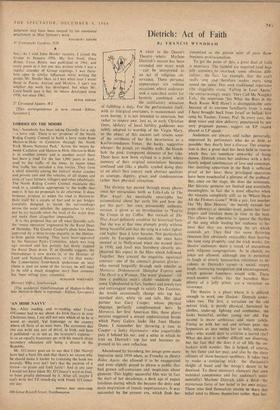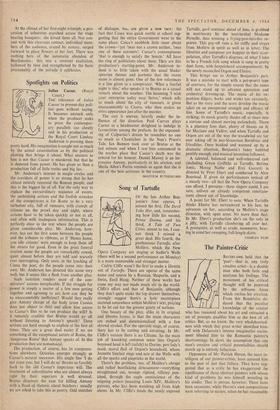Dietrich: Act of Faith
By FRANCIS WYNDHAM A VISIT to the Queen's Theatre--where Marlene Dietrich's season has been extended one more week —can be interpreted as an act of religious ob- servance. These personal appearances are solemn occasion's where audiences seek a sanctified outlet for hysteria combined with
the satisfactory sensation of fulfilling a duty. For the performance itself, with its liturgical overtones, is monotonous and even boring; it is not intended to entertain. but rather to inspire awe. Just as, in early Christian times, idolatry of local fertility goddesses was subtly adapted to worship of the Virgin Mary, so the object of this ancient cult retains some of the attributes of her first incarnation as a Kurftirstendamm Venus: the husky, suggestive whisper; the proud, yet stealthy walk; the blonde bob; the pink, transparent shimmer of her robe. These have now been stylised to a point where memory of their original associations becomes confused and (like a phallic symbol doing duty as an altar) they convey such abstract qualities as courage, dignity, grace and condescension rather than physical attraction. •
The divinity has passed through many phases since her miraculous birth as Lola-Lola in The Blue Angel. An unreliable apocrypha has accumulated about her early life and how she got this part: her own, presumably authentic version, is given as an introduction to 'You're the Cream in my Coffee.' But revivals of The Blue Angel definitely establish the historical facts that she was at that time plumply pretty without being beautiful and that she sang in a voice lighter and higher than it later became. Not particularly exotic by European standards, she must have seemed so to Hollywood when she moved there in 1930, and Josef von Sternberg cleverly em- phasised this aspect in the films which followed. Together, they created the exquisite, equivocal creature—one of the cinema's greatest glories— who moved languidly through such vehicles as Morocco, Dishonoured, Shanghai Express and The Devil is a Woman. The word `glamour'--till then a publicity man's cliche—suddenly made sense. Upholstered in furs, feathers and jewels rare and extravagant enough to satisfy Des Esseintes, she would occasionally change into top hat, starched shirt, white tie and tails. Her ideal partner was Gary Cooper, whose physical elegance perfectly complemented hers. In Morocco, her first American film, these glossy narcissi suggested a sexual sophistication beside which Pussy Galore looks like Joan Hunter Dunn. I remember her throwing a rose to Cooper--a lanky legionnaire—who coquettishly puts it behind his ear; and a scene in which he tries on Dietrich's top hat and becomes en- grossed in his own reflection.
Abandoned by Sternberg, her image grew more imprecise until 1939 when, as Frenchy in Destry Rides Again, she allowed it to be exaggerated and even slightly guyed to please a public that had grown self-conscious and suspicious about glamour. This highly successful film was in fact the start of her decadence, a dark age of pagan fetishism during which she became the deity and main inspiration of female impersonators. It was succeeded by the present era, which finds her
canonised as the patron saint of pure show- business professionalism.
To get the point of this, a great deal of faith is necessary. The faithful are required (and hap- pily consent) to overlook some obvious diffi- culties: the fact, for example, that she can't really sing and therefore makes every song sound the same. Her own traditional repertoire (the sluggishly erotic 'Falling in Love Again,' the embarrassingly saucy 1 hey Call Me Naughty Lola,' the imperious 'See What the Boys in the Back Room Will Have') is distinguishable only because of its extreme familiarity from 'a song I have brought back from Israel' or ballads first sung by Tauber, Trenet, Piaf. In every case, the deep voice and slow delivery, punctuated by not very pregnant pauses, suggest an EP record played at LP speed.
Audiences are always, and rather perversely. impressed by performers who do as little as possible; they dearly love a disease. The assump- tion is that a great deal has been held in reserve which they are somehow unworthy of being shown. Dietrich treats her audience with a bril- liantly judged combination of love and contempt. Her dazzling apparition in the flesh is sufficient proof of her love; these privileged spectators have been vouchsafed a glimpse of the godhead. But, once on the stage, she does the minimum. Her hieratic gestures are limited and essentially meaningless; in fact she is most effective when she remains completely still, as in 'Where Have All the Flowers Gone'?' With a gay, fast number like 'My Blue Heaven,' she merely extends her arms sideways at shoulder-level, points her fore: fingers and revolves them in time to the beat. This allows her otherwise to ignore the rhythm of the song while leading her audience to be- lieve that they are witnessing the art which conceals art. They find this more flattering (because less obviously enjoyable) than hearing the tune sung properly, and the trick works; for theatre audiences share a streak of masochism with religious congregations. As in church, no jokes are allowed; although one is permitted to laugh at utterly humourless references to in- cidents in Dietrich's career---a social, empty laugh, conveying recognition and encouragement, which genuine funniness would stifle. These mock-modest sallies, like the harmless blas- phemy of a jolly priest, are a variation on reverence.
The theatre is a place where it is difficult enough to work one illusion : Dietrich under- takes two. The first, a variation on the old mirror trick, is purely physical. Sustained by clothes, make-up, lighting and confidence, she looks beautiful, neither young nor old. The second is more ambitious and more subtle. Fixing us with her sad and serious gaze, she hypnotises us into seeing her as holy, untouch- able--who would dare to criticise a sacred rite? What she does is neither difficult nor diverting, but the fact that she does it at all fills the on- lookers with wonder. She is helped, of courser by her fame and her past, and also by the sheer silliness of show-business snobbery. It takes two to make a conjuring trick: the illusionist's sleight of hand and the stooge's desire to be deceived. To these necessary elements (her own technical competence and her audience's senti- mentality) Marlene Dietrich adds a third --the mysterious force of her belief in her own magic. Those who find themselves unable to share this belief tend to blame themselves rather than her. At the climax of her first-night triumph, a pro- cession of usherettes marched across the stage bearing bouquets: she kissed them all. Not con- tent with this vicarious contact, individual mem- bers of the audience, crazed by ecstasy, surged forward to place flowers at her feet. There was nothing here of the automatic abandon of Beatlemania : this was a reverent exaltation, hallowed by time and strengthened by the basic irrationality of the miracle it celebrates.



































 Previous page
Previous page